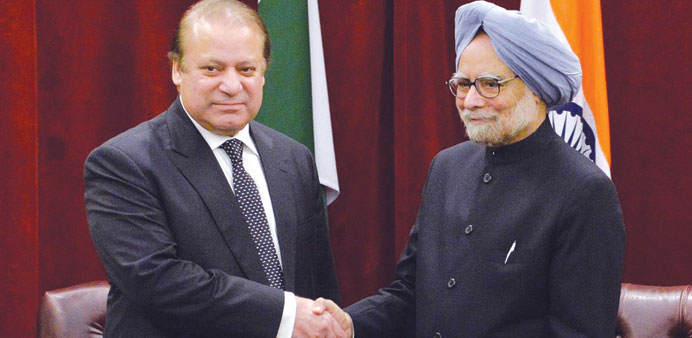Prime Minister Nawaz Sharif with his Indian counterpart Manmohan Singh. Islamabad says it has delayed the MFN decision so as not to be seen favouring one political party with the forthcoming elections in India.
|
The recent decision by Prime Minister Nawaz Sharif to postpone granting India the Most Favoured Nation (MFN) status has come as a bit of a disappointment after speculation that the “needful” would be done over a special cabinet meeting to be presided over by Sharif. |
Eventually, no such meeting took place and a word on the postponement was made by the PM from The Hague, where he had gone for a two-day nuclear summit attended by world leaders.
Sharif put it down to a “lack of consensus” and also because Islamabad did not want to “favour a single political party ahead of the forthcoming general elections in India”.
Technically, not much of an argument can be advanced against what are entirely plausible grounds for the prime minister to have made that decision.
However, since the subject is Indo-Pak relations, inevitably, there are grey areas concerning decision-making whether it comes from Islamabad or New Delhi. Political pundits have made the case that Sharif has had to rethink the MFN approval under pressure from the security establishment.
It has also been suggested that the Foreign Office in Islamabad has also consistently pushed with the prime minister to put the issue on the back burner until a new government is formed in New Delhi since “it would not be prudent” - in the words of an unnamed official source -“to gift (MFN to) a ruling party, which has little chance of winning the elections”.
The perception in Pakistan is that the Congress Party is looking down the barrel with the tide rising in favour of the Bharatiya Janata Party, which Islamabad appears to have assessed would be at the head of a new coalition.
So how much substance is there to the perception that the military has prevailed in the decision-making in Islamabad with regards to the MFN?
Contrary to the popular notion, it is unlikely to be entirely down to the military’s oft cited “historical resistance” to opening up trade with India. Doubtless, it continues to enjoy considerable say in foreign policy, but it would be a misnomer to suggest that it prevailed in this instance, too.
For one, Sharif had made his intentions clear well before his election to the highest office, a third time, last year. He promised to go the whole nine yards to pursue peace with India, especially trade.
Sharif even invited the Indian prime minister to his oath-taking (unprecedented for an elected leader, who, strictly speaking, was yet to assume office although the invitation predictably got lost in the din of if, when and how it was delivered).
During his decade-long stint in power, Indian Prime Minister Manmohan Singh has enjoyed respect and a certain warmth even though bilateral ties have fluctuated and power in Pakistan changed hands during this time from General Musharraf to President Zardari (his PM Gilani) and now, Prime Minister Nawaz Sharif.
Sharif, an industrialist, is said to have been keen to push for sustainable trade ties with India to the extent that he was not even averse to granting the MFN status to an outgoing government in New Delhi. However, mitigating factors contributed to the eventual decision to postpone it.
Foremost, Prime Minister Singh’s inability to visit the country of his birth - Gah in Pakistan - despite the occasional willingness in response to repeated invitations in the last decade is viewed in Pakistan as the greatest of all missed opportunities that could have majorly contributed to this end. Why? Because, in the ultimate analysis, as an ideal CBM, it would have gone a long way in selling it to the domestic audience.
Granting MFN is a major climb for any civilian government in Pakistan - little short of an adventure that can bite back politically. To begin with, there is a certain unease about even the term, which is why Islamabad prefers to call it Non- Discriminatory Market Access (NDMA).
This apart, there is the outstanding issue of a huge trade imbalance, making potential trading partners this side of the Indus, wary. Since 2008, the trade deficit is said to have increased four times in favour of India.
A leading industrialist, who knows the ins and outs of the trade so-to-speak, says even though India granted Pakistan MFN status way back in 1996, it imposed non-tariff barriers (NTBs) to insulate its local industries, and that these, were a hindrance for Pakistani exporters to access the Indian market freely. Islamabad has already sought reduced tariffs on 250-300 items.
The scepticism compounds when seen against the sheer scale of the two economies and the fact that Indian products are cheaper than Pakistan’s, and despite most Pakistani goods boasting better quality, they would be competing at a disadvantage in terms of prices.
In fact, Pakistani farmers had planned an agitation at the Wagah border last week against what they felt would have put them at a disadvantage compared to the subsidies for agriculture enjoyed by their counterparts across the border.
In a nutshell, granting MFN to India would be a no mean feat for the Sharif government, if and when the deed is done!
♦ The writer is Features Editor.

